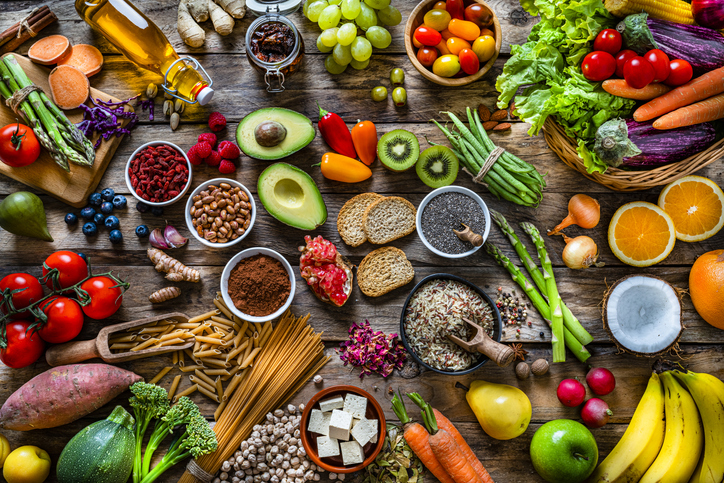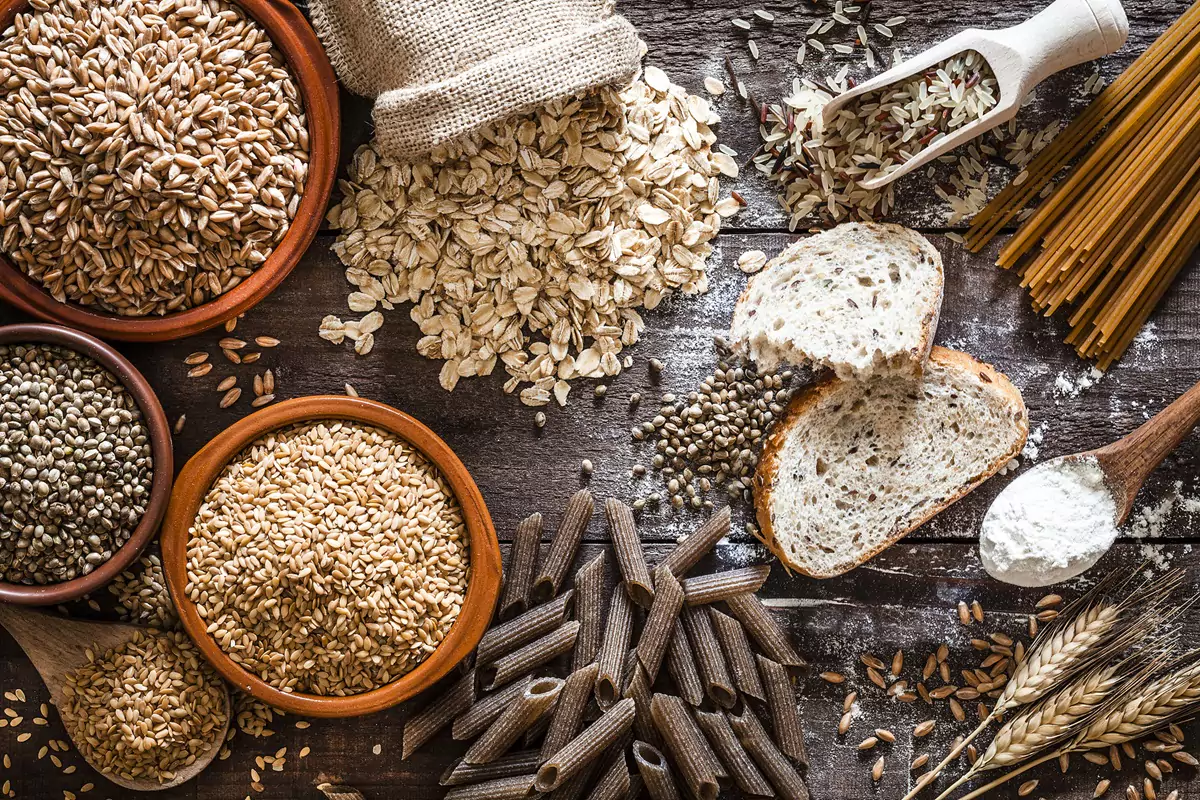






5 Diabetic Friendly Foods with a Freedom to Eat


Table of Contents
- 1. Chia Seeds: Your Diabetic Powerhouse
- Why does weight loss matter when we're discussing diabetes?
- 2. Nuts: A Healthy Handful for Diabetics
- A Variety of Goodness in Each Nut
- Nuts in Action: Research Findings
- Incorporating Nuts into Your Diet
- 3. The Hidden Treasure: Broccoli Sprouts - The Super Veggie
- Let's Start with the Basics
- SugarMD Advance Glucose Support
- 4. Okra: Uncovering the Wonders of a Hidden Gem
- A Traditional Remedy
- Reducing Cholesterol and Blood Sugar
- The Magic of Mucilage
- Anti-stress Effects
- Potential Anti-cancer Properties
- Precaution
- 5- Berries: Antioxidant-Rich Superfruits for Diabetes Management
- Nutrient Powerhouses
- The Antioxidant Advantage
- Blood Sugar Regulation
- Heart Health
- Lowering Diabetes Risk
- Berry Considerations
- Conclusion
- About The Author
Managing a diabetic diet can feel like walking a tightrope – keeping carbs, fats and proteins balanced while ensuring tasty, fulfilling meals. But here's the good news: There are plenty of foods that can seamlessly fit into your diabetic-friendly diet. Let's venture into the world of delicious, diabetic friendly foods for a healthy diet that can be enjoyed freely even with diabetes.
1. Chia Seeds: Your Diabetic Powerhouse
Chia seeds are a remarkable superfood that packs an astonishing punch for their small size. Imagine this – just a mere 25g serving of these seeds can deliver over 8 grams of fiber. This makes them a mighty ally for anyone managing their diabetes, aiding in maintaining healthier blood sugar levels. For those of you wondering, "What's so special about fiber?" well, fiber plays a crucial role in controlling how your body handles sugars.
Unlike simple carbohydrates which can cause your blood sugar levels to spike and then crash, fiber aids in creating a more steady release of sugars into your bloodstream. This, in turn, helps manage blood sugar levels more effectively and improves insulin sensitivity which is particularly beneficial for people dealing with diabetes. But the health benefits of chia seeds go beyond their fiber content. These small yet mighty seeds have been scientifically proven to help in weight loss.
In a study conducted over six months, participants who added chia seeds to their low-calorie diets experienced significant weight loss. They outperformed their counterparts who were using oat bran as part of their diet, showing the power chia seeds can have on your weight management efforts.
Why does weight loss matter when we're discussing diabetes?
Obesity or being overweight is one of the primary risk factors for developing Type 2 diabetes. Shedding excess pounds can improve insulin resistance – your body's ability to use insulin efficiently – and lower your risk for diabetes. As such, having a natural, nutritious food like chia seeds aiding in weight loss can be a significant advantage in managing or preventing diabetes. But the goodness of chia seeds doesn't stop here.
These powerful seeds have been linked to reducing the risk factors associated with metabolic syndrome, a group of conditions including increased blood pressure, high blood sugar, excess body fat around the waist and abnormal cholesterol levels. All of these conditions can increase your risk of heart disease, stroke and Type 2 diabetes. Therefore, by incorporating chia seeds into your diet, you're not only managing your diabetes but also boosting your overall health.
Let's not forget that chia seeds can be a delicious addition to your meals too! They have a mild, nutty flavor that goes well with many foods. And if you soak them in water, coconut milk or nut milk they expand and form a gelatinous, jelly-like substance that can add a fun texture to your dishes.
Mix this nutritious jelly with your favorite fruits for a wholesome and filling breakfast or dessert and voila – you've got a tasty, diabetes-friendly meal! In essence, chia seeds, with their high fiber content, weight loss boosting properties and ability to reduce the risk factors of metabolic syndrome, truly earn their place as a diabetic's best friend. So the next time you're at the grocery store, don't forget to grab a bag of chia seeds. These tiny seeds can help you pack a significant punch in your fight against diabetes.
2. Nuts: A Healthy Handful for Diabetics
Nuts are nature's way of proving that good things come in small packages. Their rich profile of healthy fats, fiber and protein make them a beneficial and tasty addition to any diabetic-friendly diet. Nuts are an excellent source of energy and when eaten in moderation they can offer substantial health benefits that extend far beyond diabetes management.
A Variety of Goodness in Each Nut
The beauty of nuts is that they come in many varieties, each offering its own unique blend of nutrients. Here, we'll dive into the benefits of several nuts and why they're perfect for a diabetic diet.
- Almonds: These little nutrition powerhouses are rich in vitamin E, a powerful antioxidant that fights inflammation and promotes eye health. They're also an excellent source of fiber and protein which can help control your blood sugar levels and make you feel satisfied for longer.
- Pistachios: Pistachios pack a punch of protein and fiber too. They also have a low glycemic index which means they have minimal impact on your blood sugar levels, making them a great snack for diabetics.
- Walnuts: Known for their high levels of omega-3 fatty acids, walnuts are a heart-healthy snack. They help lower bad cholesterol levels, reducing the risk of heart disease which is a common concern for those with diabetes.
- Cashews: Cashews are a significant source of vitamin K, a nutrient essential for proper blood clotting. They're also high in copper which plays a role in maintaining nerve health—a critical factor for diabetics who may be prone to nerve damage.
- Brazil nuts: Brazil nuts are famous for their high selenium content, a trace mineral that boosts the immune system and supports metabolism.
- Hazelnuts and Macadamia nuts: Both these nuts are high in monounsaturated fats. These healthy fats can help lower LDL (bad) cholesterol levels and increase HDL (good) cholesterol levels which is beneficial for heart health.
Nuts in Action: Research Findings
A growing body of scientific evidence endorses the health benefits of nuts for diabetics. One particularly compelling study found that eating between 40-100 grams of nuts five times a week can lower LDL cholesterol by up to 19%.
Lowering LDL cholesterol is crucial because as a diabetic, you're at an increased risk of developing heart disease. But the benefits of nuts don't stop there. Their high fiber content helps regulate blood sugar levels, ensuring they don't spike after meals—an essential factor for managing diabetes. Nuts also offer a wealth of antioxidants, compounds that fight harmful free radicals in the body, reducing inflammation and protecting against various diseases.
Incorporating Nuts into Your Diet
Given these impressive benefits, it's clear that nuts can be a fantastic addition to a diabetes-friendly diet. However, it's essential to remember that while nuts are full of health benefits they are also high in calories. Portion control is key.
Try adding a handful of mixed nuts to your morning cereal or oatmeal, sprinkle chopped nuts on your salad at lunch or have a small portion as a satisfying afternoon snack. By integrating a variety of nuts into your diet, you can reap their diverse health benefits while enjoying some delicious flavors.
3. The Hidden Treasure: Broccoli Sprouts - The Super Veggie
Broccoli sprouts: they might not be the first thing that pops into your head when you think of diabetes-friendly foods. In fact, you might not have thought about them at all, especially considering their big brother, broccoli, often steals the limelight. But these small but mighty greens are packed with a treasure trove of nutrients that make them a veritable superhero for those managing diabetes.
Let's Start with the Basics
What are broccoli sprouts? Simply put they are the three to four-day-old baby versions of broccoli. And guess what? They carry more than a hundred times the sulforaphane content compared to mature broccoli. If you're wondering what sulforaphane is, it's a plant compound, one of the most potent antioxidant and detoxification substances that we know of today. It's this component that makes these sprouts a hidden gem in the fight against diabetes.
Broccoli sprouts also come packed with an impressive amount of protein, fiber and antioxidants. We all know proteins are essential for body repair and growth but did you know that fiber aids in controlling blood sugar levels? When we consume foods high in fiber the sugar in our food is absorbed into the bloodstream more slowly which helps prevent spikes in blood glucose and insulin levels. The sprouts are also chock-full of antioxidants - powerful substances that sweep up harmful free radicals in the body.
Free radicals are unstable molecules that can cause harm if their levels become too high in the body, contributing to heart disease cancer and other diseases. So, eating a diet rich in antioxidants like broccoli sprouts can help protect our bodies from these damaging particles.
And let's not forget about vitamin C - broccoli sprouts are high in this essential nutrient too. One 85g serving of sprouts can meet over half of your daily vitamin C needs. Vitamin C is known for boosting our immune system but it's also crucial for the production of collagen, a protein needed for wound healing - an important factor for those with diabetes as they often experience slower wound healing times.
But back to sulforaphane the compound that catapults broccoli sprouts to superfood status. Recent research studies have discovered that sulforaphane has unique anti-diabetic properties. In one fascinating study, participants who took a broccoli sprouts extract showed an improvement in HbA1C, a marker of long-term blood sugar control. They also witnessed a 6.5% reduction in fasting blood sugar over a twelve-week period.
SugarMD Advance Glucose Support
Maintaining healthy blood sugar levels can be a challenge. From carby meals to snacks and even with all the effort, it’s still not enough. That’s where SugarMD Advanced Glucose Support comes in.
Our blend of traditional Ayurvedic herbs helps regulate blood sugar levels, curbs cravings, supports weight loss, boosts metabolism and energy. Endorsed by endocrinologists, this unique formula of pure, potent herbs promotes overall blood sugar health. Ideal for both pre-diabetics and Type 2 diabetics.
4. Okra: Uncovering the Wonders of a Hidden Gem
For years, okra has been quietly growing in gardens, often overlooked in favor of more popular veggies. However, it's time to give this unsung hero the spotlight it deserves. Okra, a green, finger-shaped vegetable, is truly a hidden gem with numerous health benefits. Its potential in managing diabetes, coupled with its anti-cancer properties, makes it a standout choice in the world of health foods. Let's embark on a journey to discover the wonders of this underestimated vegetable, its health benefits and why it could be the next big thing in diabetes management.
A Traditional Remedy
Okra, though perhaps less celebrated in Western culture, is revered in various parts of the world. Its use as a traditional remedy for diabetes in Turkey, for instance, speaks volumes about its medicinal potential. The benefits of this humble vegetable go beyond just managing blood sugar levels. Okra has the ability to impact our health in a plethora of ways, ranging from reducing cholesterol to preventing blood clots and even offering anti-stress effects.
Reducing Cholesterol and Blood Sugar
Our bodies need cholesterol but when its levels go awry, health complications arise. Here's where okra steps in. Rich in dietary fiber, okra assists in reducing cholesterol levels, particularly low-density lipoprotein (LDL), often dubbed the 'bad' cholesterol.
The relationship between okra and blood sugar control is even more impressive. The fiber content aids in the slow release of sugar into the bloodstream which ensures a more steady and manageable blood sugar level. This makes okra a powerful ally for individuals with diabetes.
The Magic of Mucilage
A distinctive characteristic of okra is its 'slimy' texture which comes from the plant's mucilage. While this might be off-putting for some, this mucilage actually boasts significant health benefits. It is a form of soluble fiber and has been linked to reducing LDL cholesterol levels even further. By trapping cholesterol in the digestive system, it prevents the cholesterol from being absorbed into the body and subsequently reduces the overall levels.
Anti-stress Effects
Modern life is fraught with stress. It's almost inevitable. The good news is, okra has been found to offer anti-stress effects. It's an abundant source of antioxidants which help our bodies cope with the oxidative stress resulting from our busy lives.
Potential Anti-cancer Properties
Okra's potential extends to inhibiting the growth of certain cancer cells, specifically breast cancer. It's a remarkable discovery that places okra in the esteemed category of potential cancer-fighting foods. The research is promising but it's important to remember that it's still ongoing. Nevertheless, this finding adds another feather in okra's already impressively feathered cap.
Precaution
While okra's benefits are undeniable, it's crucial to exercise caution if you're using Metformin, a common diabetes medication. Okra may interfere with this drug, so consulting your doctor before integrating okra into your diet is highly recommended. From managing diabetes and reducing cholesterol to its potential anti-cancer properties, okra is truly a hidden gem. It's time we recognize this humble vegetable for the superfood it is and start incorporating it into our diets for a healthier, balanced lifestyle.
5- Berries: Antioxidant-Rich Superfruits for Diabetes Management
Eating well is essential to managing diabetes and including a diverse range of foods in your diet is the key to obtaining all the necessary nutrients. Among these, berries, notably blueberries and strawberries, have proven to be powerful, diabetes-friendly superfoods. This is due to their remarkable nutritional profiles and the positive impacts they have on overall health. Let's delve into the reasons why these vibrant, juicy fruits are so beneficial for managing diabetes.
Nutrient Powerhouses
Berries are packed with healthful nutrients. They are high in vitamins such as vitamin C and K and minerals like potassium and manganese. They also contain plant compounds or phytonutrients that have antioxidative and anti-inflammatory effects, contributing to their bright colors. These compounds include anthocyanins, ellagic acid and resveratrol.
The Antioxidant Advantage
Berries are renowned for their antioxidant properties. Antioxidants are crucial for health as they fight off free radicals - harmful molecules that can cause damage to our cells and contribute to aging and diseases. The abundance of antioxidants in berries helps to reduce inflammation and oxidative stress which are often increased in people with diabetes. This makes berries not just a tasty treat but also a weapon in the fight against diabetes-related complications.
Blood Sugar Regulation
What sets berries apart is their ability to regulate blood sugar levels. Despite their sweet taste, berries have a low glycemic index (GI) which means they cause a slower, lower rise in blood sugar after consumption compared to other higher-GI foods. This is largely due to their high fiber content which slows the absorption of sugar into the bloodstream, preventing spikes in blood glucose and insulin levels.
Heart Health
But that's not all. Berries are beneficial for heart health too. They help control hypertension and alleviate symptoms of atherosclerosis, a condition characterized by the hardening of the arteries. These heart-healthy benefits are of particular importance to people with diabetes, who are at a higher risk of heart disease.
Lowering Diabetes Risk
The correlation between berry consumption and reduced diabetes risk is supported by scientific evidence. One notable study conducted by Harvard University found that individuals who ate blueberries twice a week had a 23% lower risk of developing type 2 diabetes. This association was seen even after taking into account other dietary factors, underscoring the potent anti-diabetic effects of berries.
Berry Considerations
It's important to remember that even though berries contain natural sugars they are still sugars. Therefore, moderation is key. The American Diabetes Association recommends that individuals with diabetes should consume fruit, including berries as part of a balanced diet. Consider incorporating a variety of berries into your diet to take advantage of the range of nutrients each type offers.
Therefore, berries, with their high antioxidant content, beneficial effects on blood sugar levels and heart health advantages, deserve a spot on the menu of anyone managing diabetes. They serve as an excellent example of how tasty and enjoyable foods can support overall health. Remember, managing diabetes does not mean you have to sacrifice flavor. The right foods can both nourish your body and satisfy your palate and berries are a perfect example of this.
Conclusion
Maintaining a healthy diet while managing diabetes doesn't mean you have to compromise on variety or flavor. With a wide range of superfoods at your disposal such as chia seeds, nuts, broccoli sprouts, okra, berries, eggplants and avocados, you can put together meals that not only taste fantastic but also help regulate your blood sugar levels.
These foods, rich in fiber, healthy fats and essential nutrients can actively contribute to weight management, cardiovascular health and overall wellbeing. Living with diabetes might be a challenge but it's one you can certainly meet head-on with a well-informed, balanced diet. Remember, moderation is key.
Too much of even a good thing might not be beneficial. Always consult your healthcare professional or dietitian before making significant changes to your diet. Healthful eating can be delightful eating – it's all about making smart, informed choices. Enjoy the journey to wellness with a plate full of color, flavor and above all, nutrition!
About The Author
Meet Dr. Ahmet Ergin a highly skilled and dedicated endocrinologist with a passion for diabetes care. Dr. Ergin earned his medical degree with honors from Marmara University in Istanbul. He completed internal medicine residency and endocrinology fellowship at Cleveland Clinic.
Dr. Ergin is board-certified in Internal Medicine, Endocrinology, Diabetes, and Metabolism due to his vast medical expertise. He's a certified diabetes educator, author of "The Ultimate Diabetes Book," and founder of "the SugarMD YouTube channel."
Dr. Ergin offers exceptional diabetes care to his patients in Port Saint Lucie, FL, helping them manage effectively. Disclaimer: These statements have not been evaluated by the Food and Drug Administration. Information on this website isn’t intended to treat, cure or prevent any disease. Discuss with your doctor and do not self-treat.
Written By Dr. Ahmet Ergin
456 total articles
Meet Dr. Ahmet Ergin, a highly skilled and dedicated endocrinologist with a passion for diabetes care. Dr. Ergin earned his medical degree with honors from Marmara University in Istanbul. He completed internal medicine residency and endocrinology fellowship at Cleveland Clinic. Dr. Ergin is board-certified in Internal Medicine, Endocrinology, Diabetes, and Metabolism due to his vast medical expertise. He's a certified diabetes educator, author of “The Ultimate Diabetes Book,” and founder of “the SugarMD YouTube channel.” Dr. Ergin offers exceptional diabetes care to his patients in Port Saint Lucie, FL, helping them manage effectively. For a closer look into his insights and experiences, connect with Dr. Ahmet Ergin on LinkedIn, Instagram, and YouTube.”
Disclaimer: These statements have not been evaluated by the Food and Drug Administration. Information on this website isn't intended to treat, cure or prevent any disease. Discuss with your doctor and do not self-treat.
Products















